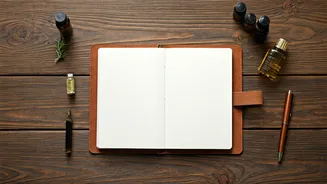What Is Journaling?
Journaling involves regularly writing down thoughts, feelings, and experiences. It is a powerful tool to understand your inner world, manage stress, and boost
self-awareness. It can improve mental clarity and foster emotional healing. Journaling is a therapeutic practice where the individual can explore their emotions, document their experiences, and reflect on their lives. By putting thoughts onto paper, individuals can gain new perspectives and identify patterns in their lives. The process encourages self-reflection, making journaling an invaluable technique for personal growth. The simple act of writing is a key way to declutter the mind and process emotions more effectively. This mindful habit can lead to increased self-understanding and a calmer state of mind, which makes the individual more resilient to the challenges of life.
Begin with Free-Writing
One of the easiest ways to get started with journaling is free-writing. This method is all about letting your thoughts flow freely onto the page without worrying about grammar or structure. Set a timer, grab a pen and paper, and write continuously for a set period, such as 5 or 10 minutes. The objective here is to empty your mind and get the thoughts out without censoring. Free-writing helps overcome the fear of a blank page and provides a quick way to release stress. Through the unrestrained expression, one can discover hidden feelings and ideas. It is an amazing way to begin your journaling practice; it requires no preparation and helps get the mind moving. The focus is on the writing process rather than the content. This allows a clearer understanding of your emotions and promotes a healthier mindset, building the foundation of consistent journaling.
Use Journaling Prompts
Journaling prompts act as a starting point, especially when you feel unsure what to write. These prompts can be anything from 'What am I grateful for today?' to 'What challenges did I face, and how did I overcome them?'. Prompts can provide structure and direction to your writing. You can find these prompts online or create your own. Prompts allow focused reflection. They offer the ability to dig into specific areas of your life, such as relationships, goals, or emotions. By answering the prompts, you can better explore your feelings and gain valuable insights. They help you stay consistent with your journaling habit. They also provide structure and reduce the feeling of being overwhelmed when you sit down to write. By answering the prompts regularly, you cultivate a habit that will lead to self-awareness and personal development.
Practice Gratitude Regularly
Practicing gratitude through journaling is a fantastic way to improve your mood and overall well-being. Each day, take some time to list things you are thankful for. This could include things such as a positive interaction with someone or the beautiful weather. Writing about the things you appreciate shifts your focus to the positive aspects of your life. This change in perspective can help you feel happier and more content. Regularly listing the things you're thankful for helps build a more positive outlook on life and boosts your overall mood. This practice, in turn, boosts your self-esteem and creates a positive feedback loop. Over time, practicing gratitude through journaling can help you better cope with stress. It will also help you create a more optimistic outlook on life.
Try Visual Journaling
Visual journaling involves using images, drawings, and other visual elements to express thoughts and emotions. This method is particularly useful for those who find it difficult to articulate their feelings through words alone. You can draw, paint, create collages, or use photographs to convey your thoughts. This technique enables a different dimension of self-expression. Visual journaling is a great way to unleash creativity and offers a unique perspective on your experiences. Combine visual elements with written entries to provide a rich representation of your inner world. This approach will benefit those who are more visually inclined. Using visuals is particularly useful for processing complex emotions or memories. It offers a fresh and impactful means of self-expression. Try it out, experiment with colours, images and words to create a deeper understanding of yourself and your experiences.














